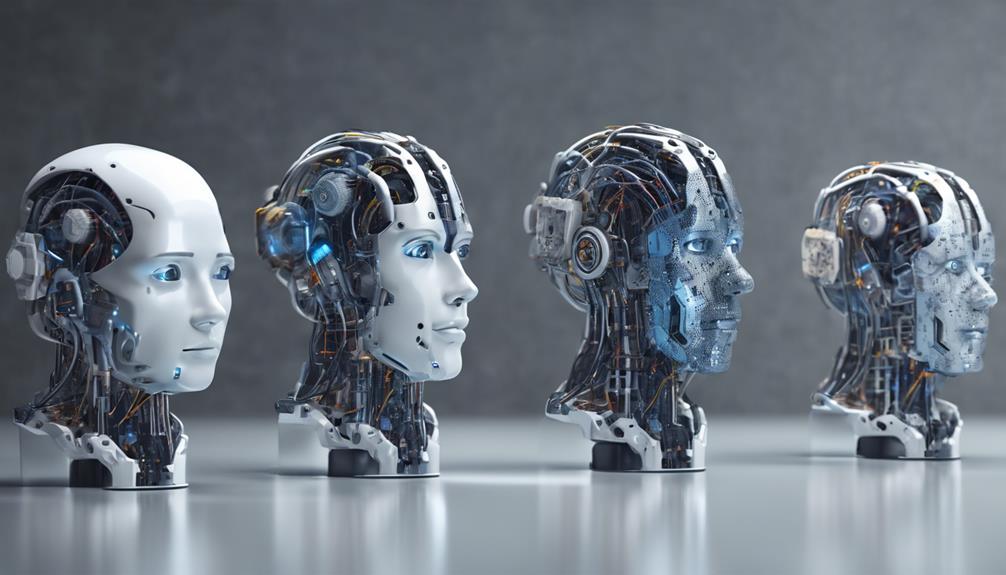
When you're looking into AI's powerhouses, you're dealing with Machine Learning, Neural Networks, Natural Language Processing (NLP), Robotics, and Ethics and AI Governance. Machine Learning lets systems learn from experience, improving over time. Neural Networks, mimicking the human brain, excel in pattern recognition and data analysis. NLP facilitates seamless human-device communication using everyday language. Robotics is reshaping industries by boosting productivity and changing job landscapes. Lastly, ensuring AI's power is used ethically and responsibly falls under AI Governance. Each of these areas offers a glimpse into how AI is sculpting a new technological era; there's always more to grasp as you explore further.
Understanding Machine Learning

Machine learning empowers you to create systems that can learn and adapt from experience without explicit programming. Imagine you're teaching a computer to recognize cats in photos. Instead of coding rules for every possible cat feature, you feed it a myriad of cat photos, and it learns to identify patterns that define what a cat looks like.
This technology hinges on algorithms—step-by-step computational procedures. These algorithms parse data, learn from it, and make predictions or decisions without human intervention. You're not programming a machine to do a task; you're programming it to learn how to do the task by itself by recognizing patterns and making inferences.
The process begins with data—perhaps the most crucial element. You provide historical data to a model, which it uses to make future predictions. For example, by analyzing past sales data, a machine learning model can forecast future sales trends.
However, it's not just about feeding data into an algorithm. You also need to refine and adjust the model based on its performance. This iterative process is key to improving accuracy. As you tweak and test different models, you're essentially teaching the machine to get better at its job, enhancing its ability to adapt and perform more effectively in real-world tasks.
The Role of Neural Networks
Diving deeper into AI, you'll see that neural networks are crucial for developing more complex pattern recognition capabilities. These systems, inspired by the human brain, consist of layers of interconnected nodes, or 'neurons,' which process information by forwarding signals through layers and adjusting connections based on the output.
You might already be interacting with neural networks daily without even realizing it. Every time you use a digital assistant, search for photos online, or even get recommendations from streaming services, you're leveraging the power of neural networks. These systems excel in analyzing vast amounts of data, identifying patterns that aren't immediately obvious to humans.
What's fascinating is how neural networks learn. They adjust their internal parameters, typically through a process called 'backpropagation.' Here, after each output, the network tweaks itself, aiming to reduce the difference between its prediction and the actual outcome. This iterative adjustment, much like learning from mistakes, is what enables these networks to improve over time.
As you delve into AI, you'll find neural networks aren't just a component; they're often at the heart of making AI systems smarter, more adaptive, and increasingly efficient. They don't just understand data; they learn from it, turning raw data into actionable intelligence.
Significance of Natural Language Processing

Natural Language Processing (NLP) empowers you to interact with technology using everyday language, making computers more accessible and intuitive. It's transforming how you manage information, search for data, and communicate with devices.
Imagine typing a question into Google and getting an answer that feels like it came from a human – that's NLP at work.
NLP also enhances your experience with virtual assistants like Siri and Alexa. They understand your commands, process your requests, and even recognize your preferences over time. This capability doesn't just make your life easier; it personalizes your interaction with technology, making it seem as though your devices really 'get' you.
Beyond personal use, NLP is crucial in business. It automates and improves customer service by powering chatbots that handle inquiries without human intervention. These systems can analyze customer feedback, interpret complex requests, and provide detailed responses. Moreover, NLP tools can sift through large volumes of text to extract relevant information, aiding in decision-making and strategy development.
You're already experiencing the benefits of NLP, perhaps without even realizing it. Each time you issue a voice command, search using conversational language, or get an instant response from a chatbot, NLP is enhancing your interaction with the digital world.
The Impact of Robotics
Robotics is revolutionizing the way you work, live, and interact with the world around you. You're seeing robots in factories, increasing productivity and taking on tasks that are either too dangerous or monotonous for humans. This shift isn't just about efficiency; it's transforming job landscapes, pushing you towards more skilled roles that robots can't fulfill.
In healthcare, robots aren't just assisting; they're transforming surgeries with precision that surpasses human steadiness. You're now witnessing minimally invasive procedures becoming the norm, significantly reducing risks and recovery times. This isn't confined to physical tasks. Robots are also enhancing personalized care, being deployed to support the elderly, helping maintain their independence for longer.
Your home life is changing too. Domestic robots are becoming household staples, handling everything from vacuuming to lawn mowing. This frees up your time, allowing you to focus on what you enjoy most.
On a broader scale, robotics in disaster response is becoming invaluable. Robots can access areas that are too risky for humans, providing critical data and even delivering aid. This capability is crucial, potentially saving more lives as machines and humans work together in new, dynamic ways.
Ethics and AI Governance

As you explore the expanding role of robotics, it's important to consider the ethical implications and the need for effective AI governance. You're stepping into a world where the decisions made by machines can significantly impact lives and societies. It's crucial to ask: who's programming these AI systems, and what biases might they inadvertently introduce?
You've got to ensure that AI systems operate transparently and are held accountable. This means setting up robust frameworks that oversee AI activities and ensuring these systems are understandable not only by the developers but also by the general public. You need to advocate for regulations that protect individual privacy and security without stifling innovation.
Consider the consequences of AI decisions. Who's responsible when an AI system makes a mistake? You should push for clear guidelines and accountability mechanisms in place, so there's always a human ultimately accountable for critical decisions.
AI governance isn't just about preventing harm; it's about guiding AI to contribute positively to society. You're in a position to demand that AI systems are designed from the ground up to enhance fairness, reduce inequality, and support sustainability. Never underestimate your role in shaping the future of AI governance.
Frequently Asked Questions
How Does AI Affect Job Opportunities in Traditional Industries?
AI's introduction impacts your job prospects in traditional industries by automating tasks, potentially reducing roles but also creating new opportunities in tech support, development, and oversight that require upskilling and adaptation to technological advancements.
What Are Common Misconceptions About Ai?
You might think AI is about replacing all jobs or surpassing human intelligence, but it's often more about aiding efficiency and making informed decisions. Misconceptions like these skew your understanding of its capabilities.
Can AI Technologies Develop Emotions or Consciousness?
You might wonder if AI can develop emotions or consciousness. Currently, AI doesn't genuinely experience emotions or consciousness; it only simulates responses based on programming and data, not real emotional or conscious experiences.
How Does AI Influence Children's Education?
AI influences children's education by personalizing learning experiences, enhancing engagement through interactive tools, and providing real-time feedback. You'll see improved educational outcomes as it adapts to individual learning styles and paces.
What Are the Environmental Impacts of AI Technology?
AI technology significantly impacts the environment through energy consumption and electronic waste. You'll find its data centers require vast amounts of power, and discarded devices contribute to growing e-waste challenges worldwide.
Conclusion
You've explored the core pillars of AI, from machine learning's algorithms that predict and learn, to neural networks mimicking human brain functionality.
You've seen how natural language processing allows machines to understand and interact using human language, and how robotics integrates these technologies into physical actions.
Lastly, you've considered the ethical frameworks essential for governing AI's expansive influence.
These components are crucial as you navigate the evolving landscape of artificial intelligence and its profound impact on society.






